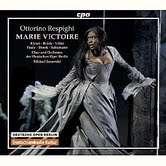|
Back
12/28/2012
Ottorino Respighi: Marie Victoire
Takesha Meshé Kizart (Marie de Lanjallay), Markus Brück (Maurice de Lanjallay), Germán Villar (Clorivière), Simon Pauly (Simon), Stephen Bronk (Cloteau), Järn Schümann (Kermarec), Martina Welschenbach (Lison Fleuriat/Emérantine), Gregory Warren (Caracalla), Nicole Piccolomini (La Marquise de Langlade), Yosep Kang (Le Marquis de Langlade), Tomislav Lucic (Le Chevalier), Thomas Blondelle (L’Abbé), Anna Schoeck (La Novice), Christopher Fel (du Fulgoët), Krzystof Szumanski (Le Marquis de Grandchamp/Monsieur Pasques), Nathan De’Shon Myers (Le Vicomte), Andrew Ashwin (Le Mouton), Hyung-Wook Lee (Le Commissaire), Frank Sufalko (Le aristocrate/Le prisonnier/Le citoyen), Heidrun Häßner (La couturière), Chor und Orchester der Deutschen Oper Berlin, William Spaulding (Chorus Master), Michail Jurowski (Conductor)
Live Recording: Deutsche Oper Berlin (April 6-9, 2009) – 164’ 45
cpo # 777 121-2 – Booklet in German, English and French

   
On December 25th the sun rose with religious significance, but so, too, the sun grew into the dawning of a new day with Tom Hooper’s cinematic cantilena, Les Misérables. The French Revolution whirling around writings of human strife by Victor Hugo is the very foundation for Ottorino Respighi’s psychological dramaturgy, Marie Victoire. Marie Victoire well represents a cogent transition between Italy’s verismo and decadentismo moods, the aforementioned of which was spawned in part by Claude Debussy and Richard Strauss.
Though closely associated with his trilogy tone poems, The Pines of Rome, The Fountains of Rome and Roman Festivals, Ottorino Respighi also grounded himself with a satisfying array of eclectic operatic works that, to this day, have been vastly overlooked. Of note, this “Revolutionary Opera” is a great start, and it is only the second time Marie Victoire has ever been presented (first premiering in January 2004 even though Respighi completed it in 1914.) While the melodrama runs a close parallel to Giordano’s Andrea Chénier (1896), it has an even greater synergy perhaps due to its more modernistic tendencies. The music swiftly drives the storyline, and it is absolutely captivating from beginning to end. This Respighi creation is a conduit to character development guided by tutti orchestra and solo instruments (i.e. violin, harp, gong and bell) which add to its sheer intensity. An issuance of imploding decadence flows within the channels of cerebral truth and dives into an aberrant abyss of eros, similar to that of Franz Schreker’s Die Gezeichneten (Read here).
Marie Victoire centers around moral dilemmas, of duty and honor, with a historical backdrop that begins on July 27, 1794 and ends on December 24, 1800 and at the height of Maximilian Robespierre’s “Reign of Terror.” Takesha Meshé Kizart is fitfully cast in the title role whose dramatic voice has such incredible power that she can easily reach beyond the orchestral immensities of Deutschen Oper Berlin under the gnostic eyes of Michail Jurowski. Whether paired with Markus Brück’s assured baritone voice (in the role of Maurice de Lanjallay) or mixing in with the virile velveteen voice of tenor Germán Villar as the infatuated Clorivière, Kizart draws convincing results with extraordinary register. Kizart’s emotional outpour of pathos in the criminal court of the Tribunal of the Seine (Act IV) is compelling.
Respighi layers the use of leitmotif with diversified levels of intensity which weave into the plot: the “Marie/Maurice Love Theme” (melodramatic underpinnings), “Clorivière’s Theme” (lyrical tenderness), “Il pleut bergère chanson” (music favored by Marie Antoinette) and “Ça ira” (chorus revolution.) Each of Ottorino Respighi’s notes hold significance and unleash ranges of inner emotions on part of the listener. Markus Brück’s Maurice de Lanjallay adds beauty yet determination; The Marie/Maurice love duet pervades splendidly.
Act II (“Prison Scene”) is one of the most riveting sections, historically tied to the “Thermidorian Reaction” by illuminating intensified verismo values. Here we find lives and cerebral turmoil surrounding incarcerated individuals so mindful of Jáňacek’s From the House of the Dead. Nicole Piccolomini and Yosep Kang are convincing cellmates, so much that that La Marquise and Le Marquis de Langlade encourage other inmates to rehearse Jean-Jacques Rousseau’s Le Devin du village in a half demented, macabre fashion and with a most ironic and satirical approach. Playing two roles as Lison Fleuriot (Act I) and Emérantine (Act III), Martina Welschenbach ignominiously enlightens with a convincingly roughened texture. Jörn Schümann’s voice as Kermarec appears a bit light and weak, especially when set against Simon’s bantering (Simon Pauly), the poet early on in Act I.
Reflections of other composers come through transparently, some in greater doses than others: Clorivière’s reflective memories in Act II (Debussy’s Pelléas et Mélisande end of Act IV Scene II) and love reminiscences in Act II (enactment of Le Devin du village); Puccini’s La fanciulla del West, La bohème, Madama Butterfly and even Wagner’s grandiose Die Meistersinger von Nürnberg. Similar to Giuseppe Verdi’s Don Carlos, Respighi’s Marie Victoire will have one jumping out of one’s seat with a shocking coup de théâter.
It will take several rounds to digest the immensity and volumetric subject surrounding such an eventful time in Gallic history. Pre knowledge is highly recommended in order to enrich the listener’s experience. Regrettably, the breadth and scope of Respighi’s last composed opera is an abject miss in recording circles up until this time, for Marie Victoire can rightfully stand on its own merits. This is a marvelous display of chronicling oft forgotten insights into early 1900 Italian operatic works. A stellar portrayal! (When will the DVD appear?)
Christie Grimstad
|